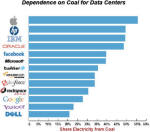The Cloud Begins with Coal |
|
1 | 2 | 3 | 4 | 5 | 6 | 7 | 8 | 9 | 10 | 11 | 12 | 13 | 14 | 15 | 16 | 17 | 18 | 19 | 20 | 21 | 22 | 23 | 24 | 25 | 26 | 27 | 28 | 29 | 30 | 31 | 32 | 33 | 34 | 35 | 36 | 37 Your smartphone is essentially coal-powered, or maybe even gas-powered. So is
your tablet, notebook computer, television, and even, if you have one, your electric
car. Just as buying one of those devices in a friendly-faced suburban retail store
doesn't change the fact that it was almost certainly built and shipped by people
whose lives are so miserable that some companies place
nets around their builds to keep suicidal souls from landing on sidewalk pedestrians,
neither does ignoring the "true" impact of your data consumerism habit make the
reality of its ramifications any less significant. Mr. Mark Mills, of the Digital
Power Group, just
Another chart in the report shows that current trends indicate Internet data transfer by PCs (personal computers) will only account for half the traffic by 2017** - that's only 4 short years away. Equipment used in data centers often are monstrously large banks of networked surplus computers that were too good to be sent to third-world countries for barefooted children to melt down PCBs to recover lead, gold, silver, and other sellable metals, but not good enough for the average first-world consumer to be satisfied with for playing games and watching movies. Hence, the energy efficiency of data centers is pretty atrocious overall. Outfitting with all new, more efficient motherboards, hard drives, routers, and power supplies would make the Internet too expensive to give away for free, and if the Internet wasn't free, the market for devices that exploit its power and convenience would tank. Interestingly, whereas you might think that this study was funded by green efforts like wind power and solar power companies, it was actually backed by the National Mining Association and by the American Coalition for Clean Coal Electricity. At a time when our government is doing everything in its (often unconstitutional) power to kill off the coal power industry, the world's voracious hunger for energy is increasing tremendously. At what point does a "crisis" ensue where a tax or some other punitive measure will be imposed on users with the ability to pay (i.e., you and me)? The usual cadre of freeloaders (aka bloc voters) will of course continue to receive their supply of data and devices on a gratis basis. Watch for it coming soon to a state near you. If all you do is peruse the plethora of well-designed charts, it is definitely worth taking a little time to review Mr. Mills' work. Tell him I sent you. * At one time Google's company slogan was, "Don't be evil." ** Machines, tablets, smartphones, and TVs make up the rest.
Posted August 16 2013 |
 "
"

